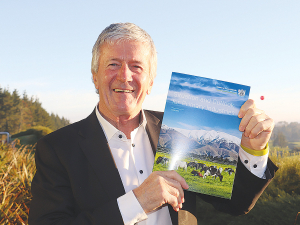NZ Catchment Groups Thrive with ‘Source to Sea’ Approach
The most successful catchment groups in NZ are those that have 'a source to sea' approach.
 Agriculture Minister Damien O’Connor concedes there is unlikely to be the same growth for primary sector returns in the year ahead.
Agriculture Minister Damien O’Connor concedes there is unlikely to be the same growth for primary sector returns in the year ahead.
Some good news - albeit temporary for primary exports.
MPI's latest Situation and Outlook report for Primary Industries (SOPI) shows that food and fibre exports will hit a record $56.2 billion dollars to the year ended 30 June 2023 - an increase of 6% on 2022.
Leading the way is the dairy sector with revenue from that sector set to increase by 14% to reach $25.1 billion for the year - despite a slight decline in milk production.
Conversely meat and wool export revenue is expected to decrease 3% to $11.9 billion for the year to 30 June 2023 - due to key meat export prices falling with the global cost-of-living crisis straining household budgets and COVID-19 challenges in China. This trend is set to continue for the next four years. MPI says the lower export prices are expected to be partially offset by higher production and export volumes for beef, lamb and mutton.
Export revenue from horticulture is expected to increase 2% to $6.9 billion, driven by the large wine vintage of 2022 offsetting lower production and exports of kiwifruit, apples, avocados and vegetables.
However, that's where the good news stops because growth in export revenue for 2024 until 2027 will remain pretty much static.
Not surprisingly horticulture, which has been hit by frosts and floods, will be going through a rebuilding phase - although some kiwifruit growers expect to be back in serious production in the next season. MPI estimates the total cost of Cyclone Gabrielle to be between $2 billion and $2.4 billion including asset damage as well as crop loss. The report devotes a whole section to the effects of the cyclone setting out the well aired effect this has had on farmers, growers, processors and the market.
The report also notes that the global economy is slowing down but poised for recovery. It says the word economy proved to be more resilient to the shocks arising from Russia's conflict with Ukraine while that labour market remains tight but shows signs of easing.
Agriculture Minister Damien O'Connor says the $56.2 billion figure is $1.2 billion dollars more this year than had been predicted. He says NZ has been through a pretty tough time with inflationary pressures and notes there is unlikely to be the same growth in the year ahead.
O'Connor says a focus in the report of what is described as 'hyper traceability' - identifying more precisely what's happening in the marketplace. He says there are expectations both from the supermarkets and the consumers, who are now using a QR code to find out exactly where their products are coming from, and that the primary sector needs to be aware of the implications of this.
New Zealand and Chile have signed a new arrangement designed to boost agricultural cooperation and drive sector success.
New DairyNZ research will help farmers mitigate the impacts of heat stress on herds in high-risk regions of the country.
Budou are being picked now in Bridge Pā, the most intense and exciting time of the year for the Greencollar team – and the harvest of the finest eating grapes is weeks earlier than expected.
The Real Estate Institute of New Zealand (REINZ) has released its latest rural property report, providing a detailed view of New Zealand’s rural real estate market for the 12 months ending December 2025.
Rural retailer Farmlands has released it's latest round of half-year results, labeling it as evidence that its five-year strategy is delivering on financial performance and better value for members.
OPINION: "We are back to where we were a year ago," according to a leading banking analyst in the UK, referring to US president Donald Trump's latest imposition of a global 10% tariff on all exports into the US.

OPINION: A mate of yours truly reckons rural Manawatu families are the latest to suffer under what he calls the…
OPINION: If old Winston Peters thinks building trade relations with new nations, such as India, isn't a necessary investment in…